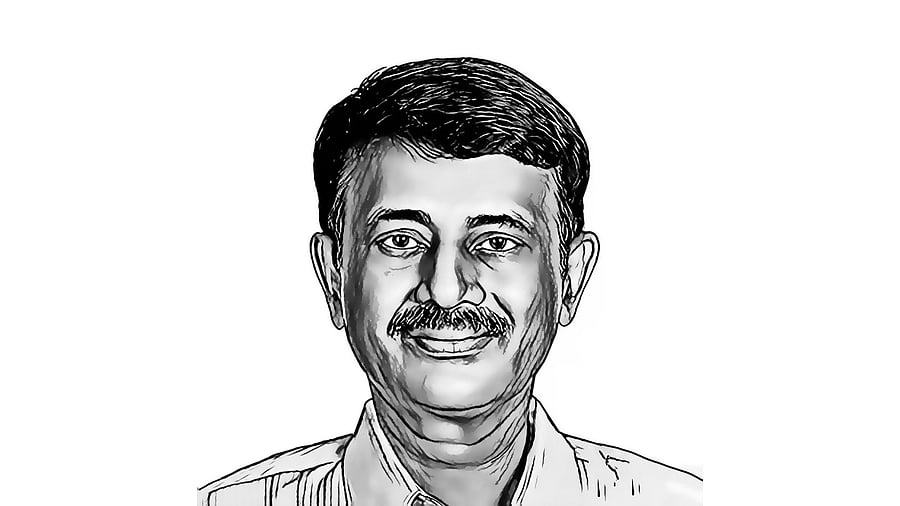
Rajeev Srinivasan is an alumnus of IIT Madras and Stanford. He has taught innovation at IIMs and had stints in Bell Labs and Silicon Valley. He focuses on technology, strategy and foreign affairs.
Credit: DH Illustration
Imagine this scenario: In a certain country, there is someone in power who is not liked by some sections of the population. Some global powers support this person; others support the opposition. One fine day, there is a coup d’etat, and this person is overthrown and exiled. The opposition takes over amidst scenes of jubilation. Pliant media condemns the former ruler and welcomes the new regime. “Democracy”, they chant.
But then shortly thereafter, darker things come to the fore. There are atrocities against certain sections of the population. These may be in violation of the norms of civilised society, and may include rapes, abductions, looting, murders, destruction, ethnic cleansing, and so on. In general, chaos reigns and human suffering is widespread.
Bangladesh, did you say? Yes, but I was also thinking of Syria. And then, this is a scenario that plays out with depressing, even metronomic, regularity in many other parts of the world. To name a few examples, there were Iraq, Libya, Iran, Afghanistan; and to look outside of West Asia, there was Chile, Congo, Guatemala, South Vietnam, Brazil, Ethiopia, Yemen, Cambodia, Laos, and Tibet, to name just a few.
Yes, it’s not just the Americans, but also the Soviets/Russians and the Chinese that have indulged in overthrowing regimes they didn’t like. And usually with similar after-effects.
It appears that there is a simple playbook. Arm and support particular groups friendly to you or your ideology, get them to overthrow the person you don’t like, and then provide covering propaganda fire for the people you installed. This is despite the inevitable mayhem and revenge that the latter inflict on their erstwhile foes as well as the collateral damage on innocent bystanders.
It’s safe to say that Ukraine’s regime change, infamously attributed to an American diplomat, also did not turn out well for that nation’s civilians. It’s not clear if these are unintended consequences, or whether the instigators truly don’t care about the damage inflicted on civilian populations. Suffice to say that there are losers at the end of the day, especially religious and ethnic minorities.
The reports coming out of Bangladesh about the atrocities being committed on Hindus there are horrendous. In effect, it looks like the Hindu population is under serious threat, which was also the experience in Afghanistan after the latest Taliban takeover. The tragedy is that the rest of the world – including India – does not seem to care. Neither do entities such as the United Nations, nor the grandly-named US Commission on International Religious Freedom.
In Syria, if there are any Orthodox Syrian Christians left (they are a community that predates the Vatican, has its liturgy in Aramaic, and owes its allegiance to the Patriarch of Antioch, not the Pope), they are surely bearing the brunt of the takeover by radical Islamists. Their forebears are said to have arrived in India around 345 CE, and some people in Kerala still call themselves ‘Syrian Christians’.
In addition, there are populations such as the Alawite sect of Islam, and there are other ancient groups such as Kurds and Druze, either in Syria or in surrounding areas. The Kurds have been fighting for an independent homeland for a long time; the Druze inhabit border areas in Lebanon and have been generally neutral in the many wars there. Given the experiences of another ancient group, the Yazidi, when radicals attacked them ten years ago, things may not look so good for these groups either.
The net takeaway is that a regime change induced from the outside is generally a bad idea for any nation, and can lead to significant human misery. India would be wise to take this lesson to heart as its political establishment engages with anti-India propaganda, and allegations of foreign meddling and attempts to destabilise the regime.
These efforts are supported by certain embedded assets inside the country: the “barbarians within” as in historian Will Durant’s words: “...civilisation is a precarious thing, whose delicate complex of order and liberty, culture and peace may at any time be overthrown by barbarians invading from without or multiplying within.” (The Story of Civilization: Part 1, Our Oriental Heritage)
If there is one strategic position India urgently needs to adopt, that would be to anticipate, forestall and thwart these attempts. They reflect not the will of the people, but malign interests.